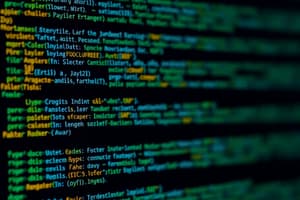Podcast
Questions and Answers
What allows a programmer defined function to interact with other functions?
What allows a programmer defined function to interact with other functions?
- Header files that include function definitions (correct)
- Function overloading
- Inline functions
- Standard library pre-defined functions
Which of the following is an example of a pre-defined mathematical function?
Which of the following is an example of a pre-defined mathematical function?
- sum(x, y)
- print(value)
- average(numbers)
- log(x) (correct)
What is true about the definition of standard library functions?
What is true about the definition of standard library functions?
- They are written by the programmer within the main code.
- They are always faster than programmer defined functions.
- They are included in header files and pre-defined by the library. (correct)
- They must be redefined in every new project.
Why is the function log(x) significant in programming?
Why is the function log(x) significant in programming?
Which statement is accurate regarding pre-defined functions?
Which statement is accurate regarding pre-defined functions?
What does the power function pow(x, y) compute?
What does the power function pow(x, y) compute?
What is the output of pow(2.0, 7)?
What is the output of pow(2.0, 7)?
Which function would you use to find the non-negative square root of a number?
Which function would you use to find the non-negative square root of a number?
If you wanted to calculate the sine of an angle in radians, which function would you use?
If you wanted to calculate the sine of an angle in radians, which function would you use?
What does the floor function floor(x) return?
What does the floor function floor(x) return?
What is the result of log10(100.0)?
What is the result of log10(100.0)?
Which of the following statements is true regarding pre-defined functions?
Which of the following statements is true regarding pre-defined functions?
To use mathematical functions in C++, which directive must be included?
To use mathematical functions in C++, which directive must be included?
What is the primary purpose of functions in a program?
What is the primary purpose of functions in a program?
How many data values can a function return in C++?
How many data values can a function return in C++?
What is a standard library function?
What is a standard library function?
Which statement about the main() function is true?
Which statement about the main() function is true?
What is the role of a function call in a program?
What is the role of a function call in a program?
Which of the following best describes local variables?
Which of the following best describes local variables?
What is the significance of reducing code duplication?
What is the significance of reducing code duplication?
Which type of function can a C++ program contain besides the main() function?
Which type of function can a C++ program contain besides the main() function?
What is the primary benefit of modular programming?
What is the primary benefit of modular programming?
Which statement best defines a function in programming?
Which statement best defines a function in programming?
What is a characteristic of a function that does not return a value?
What is a characteristic of a function that does not return a value?
How do actual parameters differ from formal parameters?
How do actual parameters differ from formal parameters?
Why is breaking down complex problems into sub-tasks beneficial?
Why is breaking down complex problems into sub-tasks beneficial?
What role can multiple programmers play in modular programming?
What role can multiple programmers play in modular programming?
Which of the following accurately identifies a type of function?
Which of the following accurately identifies a type of function?
Why is easier readability a goal of modular programming?
Why is easier readability a goal of modular programming?
Flashcards
Modular Programming
Modular Programming
Dividing a complex problem into smaller, easier-to-manage parts.
Function
Function
A block of code designed to perform a specific task.
Functions that return a value
Functions that return a value
Functions that return a value after completing their task.
Functions that don't return a value
Functions that don't return a value
Signup and view all the flashcards
Actual Parameters
Actual Parameters
Signup and view all the flashcards
Formal Parameters
Formal Parameters
Signup and view all the flashcards
Declaring a Function
Declaring a Function
Signup and view all the flashcards
Calling a Function
Calling a Function
Signup and view all the flashcards
Standard library function
Standard library function
Signup and view all the flashcards
Programmer defined function
Programmer defined function
Signup and view all the flashcards
Function calling
Function calling
Signup and view all the flashcards
Header file
Header file
Signup and view all the flashcards
Pre-defined functions
Pre-defined functions
Signup and view all the flashcards
What is a function?
What is a function?
Signup and view all the flashcards
Function Arguments
Function Arguments
Signup and view all the flashcards
Function Return Value
Function Return Value
Signup and view all the flashcards
Local Variable Scope
Local Variable Scope
Signup and view all the flashcards
Global Variable Scope
Global Variable Scope
Signup and view all the flashcards
The main() Function
The main() Function
Signup and view all the flashcards
The Power Function (pow(x, y))
The Power Function (pow(x, y))
Signup and view all the flashcards
The Square Root Function (sqrt(x))
The Square Root Function (sqrt(x))
Signup and view all the flashcards
The Logarithm Function (log10(x))
The Logarithm Function (log10(x))
Signup and view all the flashcards
The Floor Function (floor(x))
The Floor Function (floor(x))
Signup and view all the flashcards
The Sine Function (sin(x))
The Sine Function (sin(x))
Signup and view all the flashcards
Study Notes
Learning Outcomes
- Students should be able to explain modular programming benefits.
- Describe the concept of a function.
- Identify function types.
- Define, declare, and call functions.
- Use actual and formal parameters.
- Differentiate between value-returning and non-value-returning functions.
- Identify local and global variables and their scope.
Modular Programming
- Programs can be subdivided into manageable subtasks.
- Modular programming breaks down complex tasks into smaller functions.
- Advantages include:
- Ease of implementation by multiple programmers.
- Improved readability, testing, and maintenance.
- Reduced code duplication through function reuse.
Function Concept
- Functions accept zero or more input data.
- Functions perform operations or produce side effects on the input data.
- Functions return, at most, a single value.
- A function definition outlines how a function performs its task.
- A function call initiates a function's execution.
Types of Functions
- Standard Library (Pre-defined) Functions:
- Function definitions are stored in header files.
- Programmers need to understand how to use them, and which header to import.
- Examples: mathematical functions (pow, sqrt, log) in the
<cmath>header.
- Programmer-Defined Functions:
- Functions that are created by the programmer.
- Perform specific tasks.
- Can receive multiple data values or addresses (pass-by-value/reference).
- Can return a single value or modify external data (pass-by-reference).
- Must be declared and defined prior to use.
Functions in C++ Programs
- The
mainfunction is a programmer-defined function, unique to a program and essential. mainoften calls standard library functions.maincan call other programmer-defined functions.- Programmer-defined functions can also call each other.
Pre-defined Functions (Examples)
log(x): Natural logarithm of x.log10(x): Logarithm base 10 of x.pow(x, y): x raised to the power of y.sin(x): Sine of x (in radians).sqrt(x): Square root of x.tan(x): Tangent of x (in radians).
Programmer-Defined Function
- Has three parts for use: Declaration, Call, and Definition.
- Function Definition (code):
- Return type: The data type of the value returned.
- Function name: A valid identifier.
- Formal parameter list: Defines the variables to hold input data.
- Function Declaration (prototype):
- States the function’s return type, name, and parameter types.
- Placed in the global area, above the
mainor other functions. - Example:
int multiply(int, int);
- Function Call (invocation):
- Calls a defined function.
- Example:
product = multiply(multiplier, multiplicand);
Function Definition (Body)
- Contains local declarations (variable declarations).
- Statements performing the tasks of the function.
- A possible return statement.
Function Parameter
- Actual parameters: Expressions used within function calls.
- Formal parameters: Variables declared in the function definition.
- Matching types, order and number of parameters in call and definition are essential for function calls.
Function Call - Flow of Control
- Program execution transitions into the function body when a function is called.
- The calling function resumes at the point of the call after the called function completes.
Trace Function Invocation
- Step-by-step execution of function calls.
- Shows how data values are passed and returned.
Void Functions
- A function that does not return a value.
- Return type
void.
Variable Scope
- Global Scope: Variables declared outside any function are accessible throughout the program from the declaration point and onwards.
- Local Scope: Variables declared within a function are only accessible within that function.
- Static Local Variables: Local variables that retain their values between function calls, maintaining their value until the entire program ends.
Local Variables
- Exist only during a function's execution.
- Values are lost between calls.
Global Variables
- Declared outside any function.
- Accessible from anywhere within the program after declaration.
- Generally discouraged due to increased complexity and debugging difficulty.
Studying That Suits You
Use AI to generate personalized quizzes and flashcards to suit your learning preferences.




